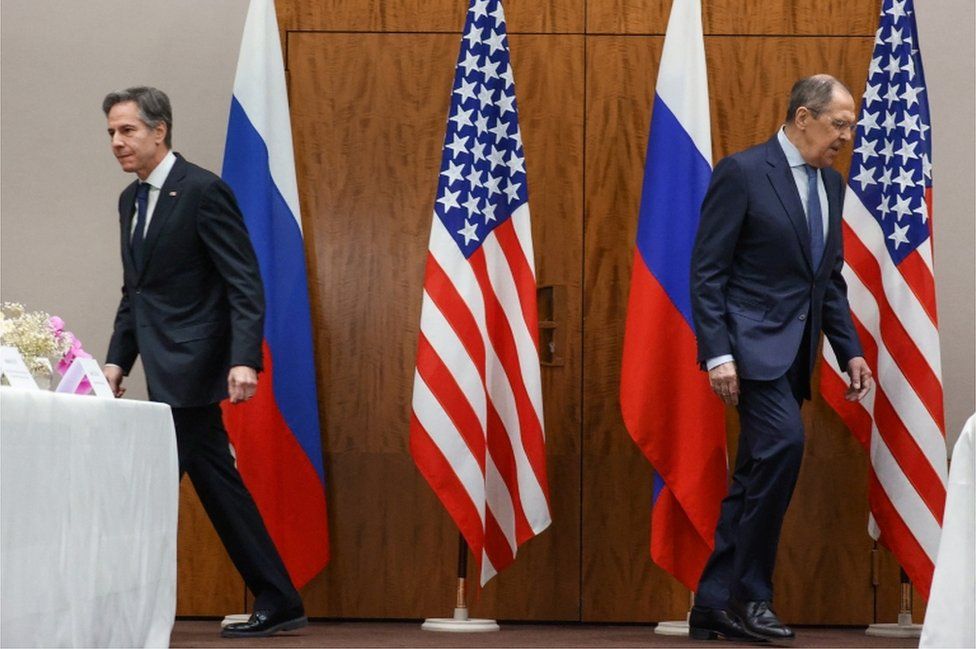US troops on high alert over stand-off as Biden to meet European allies on military deployment in Ukraine
As the world is digitally evolving, information grounded in science, truth and experience is very essential for healthy life and human sustainability. By that we are very committed to bringing you other important touched news that will best suit your health, entertainment, political, showbiz, tourism and comedy needs.
Once you have subscribed to this portal, you will be receiving other stories aside Sports News for your sustainability!
Every essential news shall be send to you and your family to be informed of and updated about the world!
Some 8,500 combat-ready US troops are on high alert to deploy at short notice amid rising tension over Ukraine, the Pentagon says.
The news comes with Russia denying it plans military action against Ukraine, despite massing 100,000 troops nearby.
President Biden is about to hold talks with European allies as Western powers focus on a common strategy in the face of Russian aggression.
The Pentagon said no decision had yet been made on whether to deploy troops.
But at the weekend President Joe Biden and his national security team discussed the possibility of sending more troops to Nato allies in eastern Europe.
Some members of the Nato military alliance, including Denmark, Spain, Bulgaria and the Netherlands, are already sending fighter jets and warships to eastern Europe to bolster defences in the region.
EU leaders Ursula von der Leyen and Charles Michel will also dial in.
Boris Johnson has warned that “gloomy” intelligence suggests Russia is planning a lightning raid on the Ukrainian capital, Kyiv.
“The intelligence is very clear that there are 60 Russian battle groups on the borders of Ukraine, the plan for a lightning war that could take out Kyiv is one that everybody can see,” he said.
“We need to make it very clear to the Kremlin, to Russia, that that would be a disastrous step.”
The Biden administration told relatives of its embassy staff to leave Ukraine on Sunday.
Ukraine said the decision was “premature”, calling it “a display of excessive caution”.
The UK has also started withdrawing staff from its embassy, with about half set to leave Kyiv.
It comes a day after the UK Foreign Office accused Russian President Vladimir Putin of planning to install a pro-Moscow figure to lead Ukraine’s government.
The man named by the Foreign Office – former Ukrainian MP Yevhen Murayev – called the claims “stupid” in an interview with Reuters news agency, while Russia’s Ministry of Foreign Affairs tweeted that the Foreign Office was “circulating disinformation”.
Over the weekend, some 90 tonnes of US “lethal aid” including ammunition for “front-line defenders” arrived in Ukraine.
US Secretary of State Antony Blinken said the government was putting together a “series of actions that would figure into [Russian] President [Vladimir] Putin’s calculus” including beefing up defences in Ukraine with more military assistance.
When Mr Blinken met Russia’s Foreign Minister Sergei Lavrov for talks in Switzerland last week, the Russian expressed hopes that “emotions will decrease”.
Diplomatic wrangling has failed to ease tensions, however, and Russia’s currency – the rouble – has seen big falls in value. The US and its allies have threatened new economic sanctions if the Russian military moves against Ukraine.

The Kremlin has said it sees Nato as a security threat, and is demanding legal guarantees that the alliance will not expand further east, including into neighbouring Ukraine. But the US has said the issue at stake is Russian aggression, not Nato expansion.
Nato’s secretary-general Jens Stoltenberg has rejected Russia’s demand for a veto, saying the alliance stands “for the right of each nation to choose its own alliances”.
Russia has seized Ukrainian territory before, when it annexed Crimea in 2014. After Russian forces seized control of the territory, it voted to join Russia in a referendum the West and Ukraine deemed illegal.
Russian-backed rebels also control areas of eastern Ukraine near Russia’s borders. That conflict has cost an estimated 14,000 lives, with a 2015 peace deal a long way from being fulfilled.